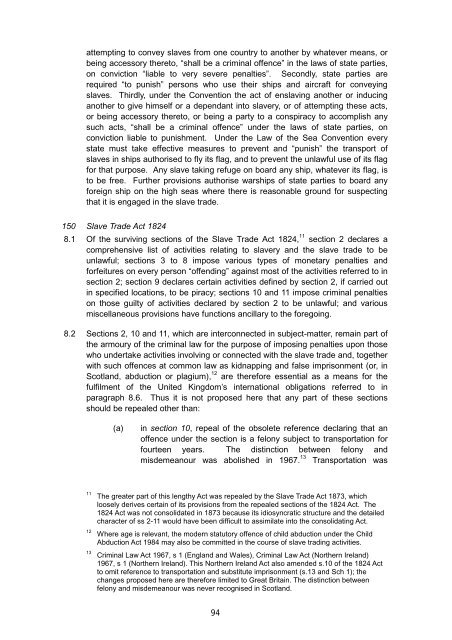STATUTE LAW REVISION: SIXTEENTH ... - Law Commission
STATUTE LAW REVISION: SIXTEENTH ... - Law Commission
STATUTE LAW REVISION: SIXTEENTH ... - Law Commission
You also want an ePaper? Increase the reach of your titles
YUMPU automatically turns print PDFs into web optimized ePapers that Google loves.
attempting to convey slaves from one country to another by whatever means, or<br />
being accessory thereto, “shall be a criminal offence” in the laws of state parties,<br />
on conviction “liable to very severe penalties”. Secondly, state parties are<br />
required “to punish” persons who use their ships and aircraft for conveying<br />
slaves. Thirdly, under the Convention the act of enslaving another or inducing<br />
another to give himself or a dependant into slavery, or of attempting these acts,<br />
or being accessory thereto, or being a party to a conspiracy to accomplish any<br />
such acts, “shall be a criminal offence” under the laws of state parties, on<br />
conviction liable to punishment. Under the <strong>Law</strong> of the Sea Convention every<br />
state must take effective measures to prevent and “punish” the transport of<br />
slaves in ships authorised to fly its flag, and to prevent the unlawful use of its flag<br />
for that purpose. Any slave taking refuge on board any ship, whatever its flag, is<br />
to be free. Further provisions authorise warships of state parties to board any<br />
foreign ship on the high seas where there is reasonable ground for suspecting<br />
that it is engaged in the slave trade.<br />
150 Slave Trade Act 1824<br />
8.1 Of the surviving sections of the Slave Trade Act 1824, 11 section 2 declares a<br />
comprehensive list of activities relating to slavery and the slave trade to be<br />
unlawful; sections 3 to 8 impose various types of monetary penalties and<br />
forfeitures on every person “offending” against most of the activities referred to in<br />
section 2; section 9 declares certain activities defined by section 2, if carried out<br />
in specified locations, to be piracy; sections 10 and 11 impose criminal penalties<br />
on those guilty of activities declared by section 2 to be unlawful; and various<br />
miscellaneous provisions have functions ancillary to the foregoing.<br />
8.2 Sections 2, 10 and 11, which are interconnected in subject-matter, remain part of<br />
the armoury of the criminal law for the purpose of imposing penalties upon those<br />
who undertake activities involving or connected with the slave trade and, together<br />
with such offences at common law as kidnapping and false imprisonment (or, in<br />
Scotland, abduction or plagium), 12 are therefore essential as a means for the<br />
fulfilment of the United Kingdom’s international obligations referred to in<br />
paragraph 8.6. Thus it is not proposed here that any part of these sections<br />
should be repealed other than:<br />
(a) in section 10, repeal of the obsolete reference declaring that an<br />
offence under the section is a felony subject to transportation for<br />
fourteen years. The distinction between felony and<br />
misdemeanour was abolished in 1967. 13 Transportation was<br />
11 The greater part of this lengthy Act was repealed by the Slave Trade Act 1873, which<br />
loosely derives certain of its provisions from the repealed sections of the 1824 Act. The<br />
1824 Act was not consolidated in 1873 because its idiosyncratic structure and the detailed<br />
character of ss 2-11 would have been difficult to assimilate into the consolidating Act.<br />
12 Where age is relevant, the modern statutory offence of child abduction under the Child<br />
Abduction Act 1984 may also be committed in the course of slave trading activities.<br />
13 Criminal <strong>Law</strong> Act 1967, s 1 (England and Wales), Criminal <strong>Law</strong> Act (Northern Ireland)<br />
1967, s 1 (Northern Ireland). This Northern Ireland Act also amended s.10 of the 1824 Act<br />
to omit reference to transportation and substitute imprisonment (s.13 and Sch 1); the<br />
changes proposed here are therefore limited to Great Britain. The distinction between<br />
felony and misdemeanour was never recognised in Scotland.<br />
94

















